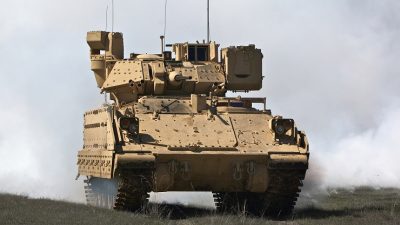America’s Broken Syria Project

A recent altercation between Russian forces and US occupiers in northeastern Syria helped highlight the increasingly tenuous position Washington holds not only in Syria but across the entire Middle East.
After complaining that American troops were “injured” in the incident and condemning Russia for “unsafe and unprofessional actions,” the United States announced that it was deploying more troops and military equipment to bolster its illegal occupation of Syrian territory.
The US also claimed its continued presence in Syria officially seeks to confront and eliminate the self-proclaimed “Islamic State” (ISIS), but official accounts maintained by the US government and the US Department of Defense on an almost daily basis provide a wide and every-shifting number of excuses.
On September 20th “Inherent Resolve’s” Twitter account would announce:
Bradley Fighting Vehicles provide the rapid flexibility needed to protect critical petroleum resources.
The region the US occupies is also where the majority of Syria’s petroleum is extracted and America’s “protection” of these resources is part of a wider strategy – not to fight ISIS – but to deny the Syrian state which has eliminated ISIS from all territory it controls – both energy and revenue from its own natural resources.
In essence, the US is in Syria weakening the Syrian government who has led the fight against ISIS and provoking confrontations with Russia who has been key in aiding Damascus against ISIS, Al Nusra, and other affiliates of Al Qaeda.
The US had been in Syria a full year before Russia’s invitation by Damascus to aid in security operations against ISIS and Al Qaeda affiliates in 2015. The Russian military promptly began bombing supply lines feeding ISIS and other terrorist groups from across the Syrian border in Turkey. ISIS’ fighting capacity rapidly collapsed and remains isolated in pockets made inaccessible by America’s continued occupation of Syrian territory.
A Microcosm of America’s Wider MENA Failure
The confrontation with Russia and the decision to boost America’s military presence in Syria is but a microcosm of America’s wider struggle to maintain its invasive primacy over the Middle East and North Africa (MENA).
Despite beginning the 21st century with an overwhelming military presence in Afghanistan and Iraq and expanding its involvement in the region in 2011 through the US-engineered “Arab Spring” – US power and influence has visibly waned. Its attempts to control virtually every aspect of Iraq’s internal politics has faltered in the face of Iraqis seeking alternative ties with neighboring Iran.
While Washington successfully toppled the government of Libya in 2011, it has failed to do likewise in Syria. Not only has it failed to oust the Syrian government, it has transformed the nation into a vector for alternative emerging global powers to contest and roll back US influence in the region. This most notably includes Russia but also Iran and China.
If at the turn of the century hundreds of thousands of US troops could not transform the region favorably for Washington, its provocative but small actions in eastern Syrian will unlikely make any difference now.
Against this backdrop is also Washington’s ongoing confrontation with Iran. It’s creation then predictable withdrawal from its “Iran Nuclear Deal” has exposed the US as a malign global player acting in bad faith. Its attempts to pressure and isolate Iran have increasingly transformed into a wider campaign to pressure and coerce a growing number of nations around the globle interested in trade and normal relations with Tehran.
The US has fewer and fewer cards to play in the region and more specifically in Syria. If Syria and its allies can find ways around crippling economic sanctions the US is using to ravage the Syrian public and undermine Damascus’ ability to ensure ISIS’ defeat endures – the US will be left with empty hands, overextended, and exposed in Syria’s eastern deserts.
The more confrontational Washington gets with Syria, Russia, and China the easier it will be for each of these nations to justify actions taken to preserve and protect their collective interests – as well as win over a larger percent of the global community to support them in these efforts. Stability is a central key to prosperity. America’s foreign policy has fully revealed itself to be a global engine of instability that is costing even its own supposed allies socioeconomic opportunities and stability.
US foreign policy is unsustainable. Those still aiding it including Turkey are preparing for direct confrontations Syria and its allies will actively avoid – and if successful – will simply surround, cut off, and let whither the presence of these uninvited foreign forces occupying Syrian territory. While it is too late for America’s “Syria project” to ever succeed in its original goal of regime change, it is not still too late for it to divest from its spiteful campaign to sink the region, its people, and their allies into a quagmire that will only further leave Washington and its allies isolated and impotent upon the global stage.
*
Note to readers: please click the share buttons above or below. Forward this article to your email lists. Crosspost on your blog site, internet forums. etc.
Tony Cartalucci is a Bangkok-based geopolitical researcher and writer, especially for the online magazine “New Eastern Outlook” where this article was originally published. He is a frequent contributor to Global Research.
Featured image is from NEO
Order Mark Taliano’s Book “Voices from Syria” directly from Global Research.
Mark Taliano combines years of research with on-the-ground observations to present an informed and well-documented analysis that refutes the mainstream media narratives on Syria.
 Voices from Syria
Voices from Syria
ISBN: 978-0-9879389-1-6
Author: Mark Taliano
Year: 2017
Pages: 128 (Expanded edition: 1 new chapter)
List Price: $17.95
Special Price: $9.95

